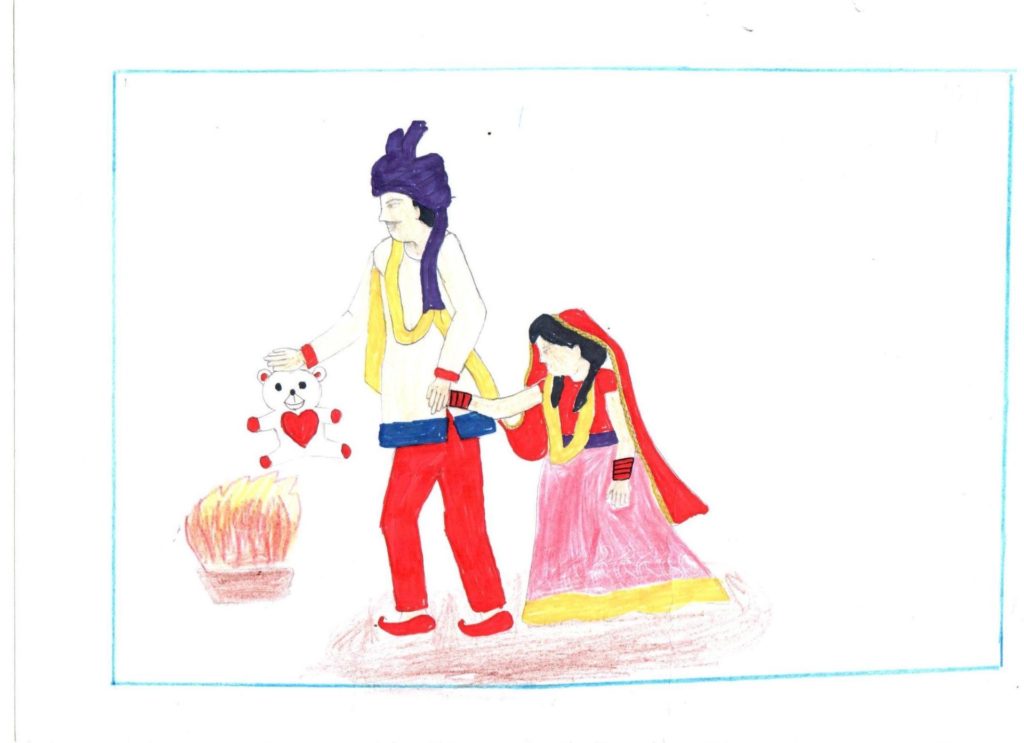Child marriage is on the increase in some parts of the world, due to the impact COVID-19 is having on families struggling to make ends meet.
To mark International Day of the Girl Child and to highlight this issue, World Vision has provided the below sharing the plight of one child bride called Shoshi (pseudonym) in Bangladesh.
She was still playing with dolls when she was married in June.
Shoshi is one of 462 girls believed to have been married in June in Bangledesh, up from the 170 married in May, according to a a report by the Manusher Jonno Foundation.
On learning more about Shoshi’s story, World Vision also asked a number of local children to draw pictures of the plight of Shoshi, with one providing the above image of a teddy about to be tossed in the flames by the groom.
It comes in contrast to Australia, the US and UK, where bear hunts and teddy bears have been placed in windows to help brighten the days of children.
COVID is driving up child marriage numbers because hungry families are desperate to ease financial pressures, and the marriage spike is threatening to derail Sustainable Development Goal 5.3 which aims to “eliminate all harmful practices, such as child, early and forced marriage and female genital mutilations” by 2030.
Shoshi’s story
“I am thirteen. Until a few months ago, I was in Grade 6 at my school in Bangladesh, dreaming of my future. I wanted to be a doctor and help people get well. But this year, COVID-19 came and it’s changed everything. My father used to pull a rickshaw to earn money but his business ended when our community was locked down to stop the virus spreading.
Late one night in June I was putting my dolls away, feeling sleepy and ready for bed. The air was warm, monsoon rain was falling noisily on our galvanized roof, and next to our house the frogs were croaking with joy at the new monsoon water. Suddenly my mother knocked at the door. She had news I did not expect.
She told me I must get ready to get married tonight.
For a minute I couldn’t speak. Then I started screaming as I saw all my dreams ruined – and fainted.
When I came to, I found myself in my new wedding sari. My older sister started decorating me as a bride in the shadowy light. I felt like I was inside a bad dream. The happy croaking of the frogs which I’ve always loved now sounded ominous to me and I felt like I was losing my senses again as things got blurry. My father told me that if I didn’t agree to marry, he would commit suicide.
“I know the law says it’s a crime but we have no money left. This man is well off. I won’t need to worry about your hunger.”
I know my mother was also worried about me, with my school closed and other girls that we know of are being exposed to increasing abuse. She saw the marriage as a way of protecting me.
I had to say yes. I had no choice. But it’s so hard to describe how strange and bad I felt, like I was dying from shock. It seemed my family was treating me as if I was a lifeless clay doll that belonged to them, something they could throw away, or break, or destroy.
I’ve always known that as a girl, I am a burden to my family. In our society, the brutal reality is that being born as a girl is like a sin. But I can’t help how I was born. Because of the deep poverty the virus has caused, I won’t go back to school. I must live with this man and bury my hopes for the future. There’s no room for those dreams any more.
In my father-in-law’s house I am very busy, managing all the household tasks for six family members. I cook, wash clothes and clean all day. I try hard, because my mother-in-law scolds me if I can’t manage everything properly.
I feel discomfort and distress living with my husband. I have been shackled by an invisible rope for the rest of my life.
Child marriage and COVID-19 in Bangladesh
COVID-19 lockdowns have pushed millions of families into deep poverty in Bangladesh, with 95 per cent of household now having very limited food stuck and more than a third of children and more than half of adults reporting have two meals a day at most, according to World Vision Bangladesh.
It means more girls are at risk of child marriage, which ends a girl’s childhood and education, increases her exposure to domestic violence, ends many of her economic opportunities and puts her at high risk for early and high risk pregnancies.
In Bangladesh, it’s against the law for girls to marry before they turn 18, and for boys to marry before they turn 21. Bangladesh has committed to ending child marriage by 2030 in line with target 5.3 of the Sustainable Development Goals, and before this year there had been a slow decrease in child marriage.
World Vision’s current fundraising campaign is here.


